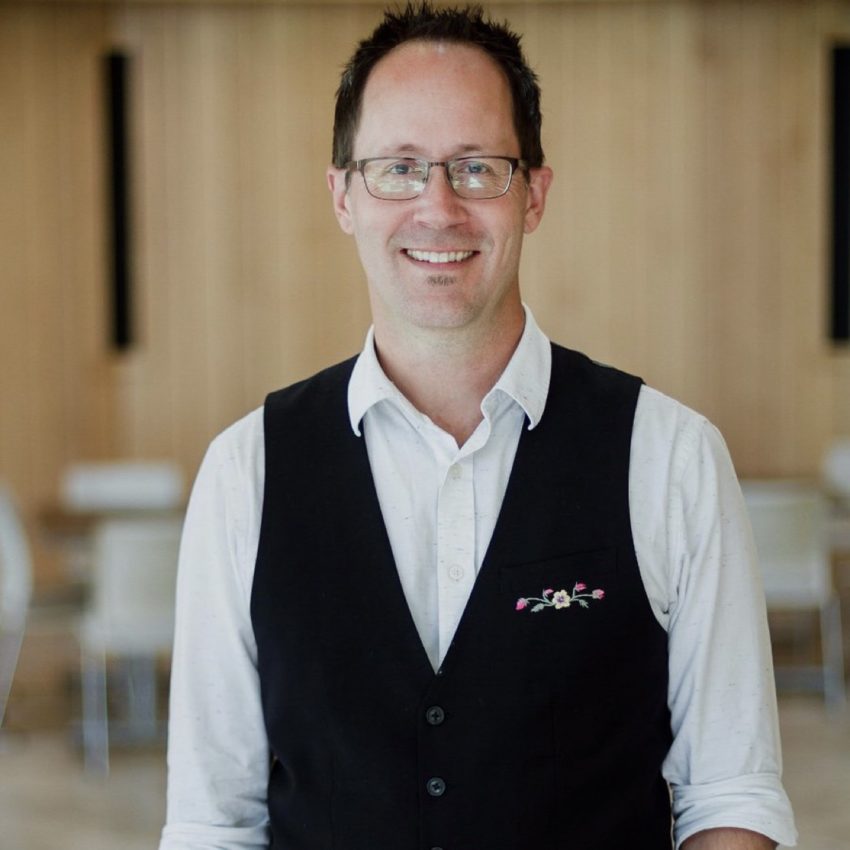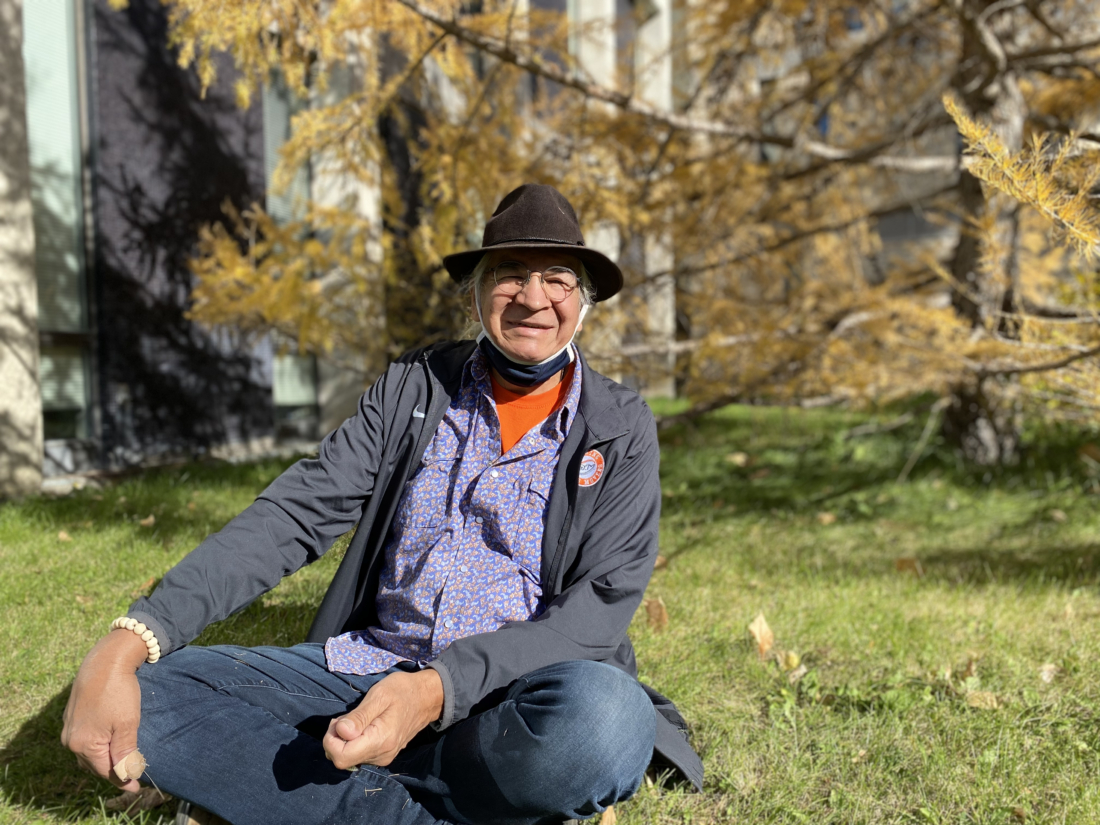Around the University of Saskatchewan campus, student groups and administration have sought the leadership of Indigenous community members to implement reconciliation initiatives.
This approach to reconciliation follows the Indigenous strategy launched by the university on Sept. 24, a plan developed by Indigenous community members that lays out calls to action and expected outcomes for the university to support reconciliation.

Dr. Stryker Calvez, the manager of Indigenous education initiatives at the U of S, and knowledge keeper Joseph Naytowhow have been involved in advising these efforts on campus. Calvez and Naytowhow spoke with the Sheaf about their experiences in university, and why they work to help make the education system better for Indigenous students today.
Calvez left his work as a researcher examining the efficacy of social programs in supporting Indigenous people to work in administration at the U of S after the university’s 2015 announcement of their commitment to indigenization — a process of integrating Indigenous paradigms in teaching and learning.
“It was this choice where I had a moment to realize whether I wanted to continue to look at [indigenization] from a distance, or if I wanted to get involved in the actual process,” Calvez said.
Calvez says he chooses to operate in academia because universities are where young people come to learn about the world and how to serve the community. He says that his administrative role is an opportunity to help create learning opportunities that are meaningful for Indigenous people and those who support reconciliation.
“It’s also a challenging place because Western institutions serve a Western need. They don’t necessarily serve an Indigenous need,” Calvez said.
“There’s this antagonism between wanting to have that impact and knowing that there’s this potential — potential to do good — but also knowing that within the system, it’s a constant struggle to sort of be Indigenous and to support a purely Indigenous ideology, worldview or epistemology.”
As a child, Calvez’s family hid their Métis identity and only reclaimed it in his later youth when they determined that attitudes towards Indigenous peoples had begun to change. This is how Calvez became interested in social and cultural psychology, which he studied in undergraduate and graduate school.
While in university, the disconnect between his worldviews as a Métis person and the worldviews he was required to learn and apply in his studies brought him to a breaking point.
“The further [I went] in grad school, the more I felt like I was losing myself, because I’ve spent all this time repeating back and giving back information and knowledge about the world in terms that were meant to support a Western understanding,” said Calvez.
At one point, Calvez took a break from his schooling to visit his mother, who helped him realize that he needed to separate his university’s needs from his personal needs. To fulfill both, he would later run two programs of research, one for his dissertation, and one in collaboration with Six Nations, a First Nations reserve in Ontario.
“I had to work twice as hard, in some ways, to manage to be myself while going through the system,” said Calvez.
Calvez says that his support has been useful to leaders at the U of S in determining a path to reconciliation. He says the 4 Seasons of Reconciliation online learning and teaching resource now being offered to faculty and graduate students, which was developed by the First Nations University of Canada, has been very successful.
He believes that the leadership of Dr. Angela Jaime, interim vice provost of Indigenous engagement, in implementing the Indigenous Strategy will also be of great help to the university in their path to reconciliation.
On Oct. 15, Jaime announced numerous Indigenous engagement projects underway.
Some of these include an Indigenous faculty and staff recruitment and retention strategy, and a new partnership with the Gabriel Dumont Institute and Saskatchewan Indian Institute of Technology called the Oẏateki partnership. The latter program aims to support Indigenous youth in transitioning and completing university.
Calvez says that the purpose of his role is not simply to inform people on what reconciliation is, but to guide people in applying their unique abilities and interests, to further the process.
“Everybody has their own gifts and when you realize that your gifts are an essential part of reconciliation, and you start to learn how you might use those gifts, that’s when people start to find their way into reconciliation.”

Joseph Naytowhow is a Plains/Woodland Cree knowledge keeper who works as a cultural advisor to organizations around Saskatchewan. This includes the U of S Students’ Union,which is creating Indigenous-student focused support this year with Naytowhow’s guidance.
“The support I see Indigenous students have here, just in general, [is] over 100 times greater than when I went to university back in 1974,” Naytowhow said.
Naytowhow graduated from All Saints Residential School in Prince Albert in 1973 before attending classes at the University of Regina.
“I had a hard time with university, partly because there’s part of me that wanted to relearn who I was, because I was brainwashed to be a Canadian. I was brainwashed to be a white person. To think, act and dress like a white person,” Naytowhow said. “And I did. I did exactly that.”
Naytowhow says he was 20 when he wanted to reclaim his Cree culture, and lacked any desire to continue his postsecondary education. Although he completed a bachelor’s of education at the U of S in 1994, he says he “barely scraped through.” He did not expect to one day work with universities, but does it now in order to share his skillset as a storyteller and knowledge of ceremonial practices.
Naytowhow says it is a challenge to teach others about a culture that he lives in everyday, while knowing that students are occupied with their studies.
“I’ve been thinking about that. Can that work? I can just give them maybe a little rain drop of information and knowledge for the whole year, and that’s about all I can do because they’re steeped in their studies,” he said.
Naytowhow would like to see a greater number of knowledge keepers throughout campus.
“Every faculty, if they really need to be indigenized, or actually need their own Elder, they need their own knowledge keeper. One to try and cover all of that is kind of an unthinkable, impossible task to try and do a worthwhile job. It’s a very big job.”
Calvez also believes that reconciliation is achieved through the diversity and number of people supporting it.
“When you think about reconciliation, you need to think about it with those broad sets of different ways in which people approach their own lives. Then, if they have these unique gifts that they use in their own lives … how do we help them support [decolonization] using their own gifts to get to a better place?” Calvez said.
“It’s a very important opportunity for the university to be a leader in this way, but in order to be that leader, we need to continue to push hard to work through the tensions that come from all these new opportunities and to help people find their own path.”
—
Sandra LeBlanc | News Editor
Photos: As Credited